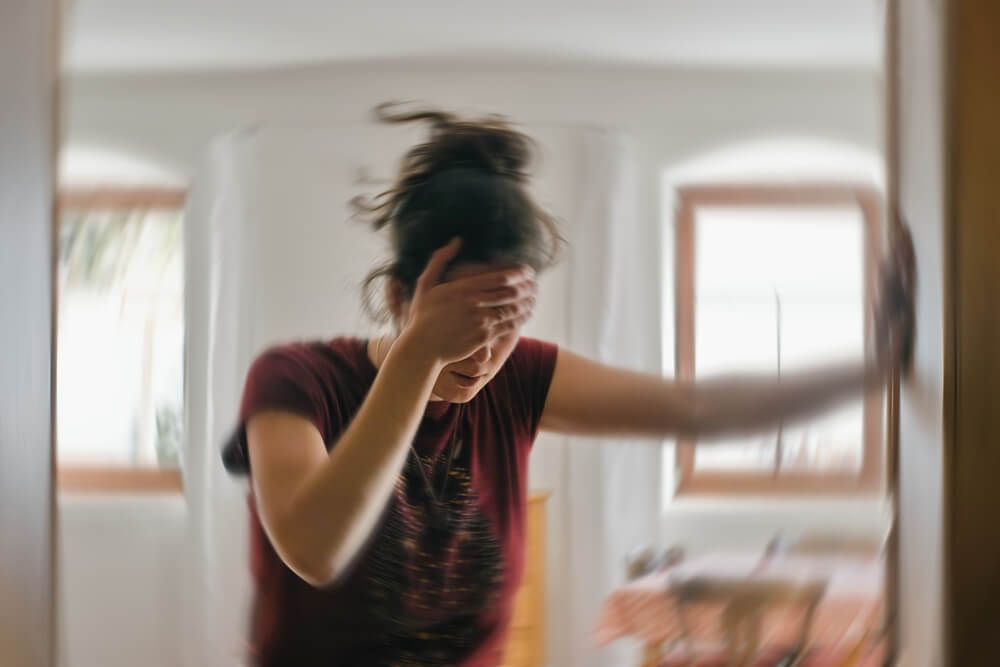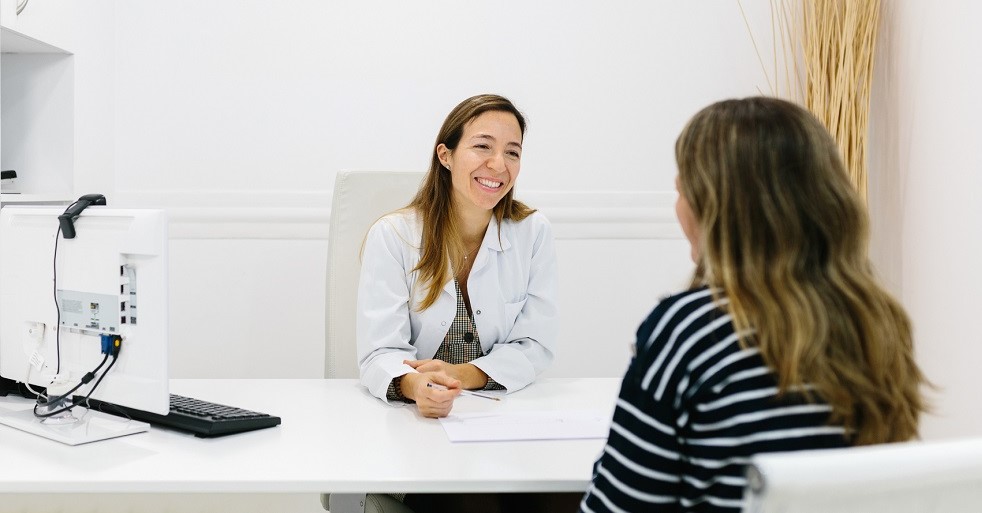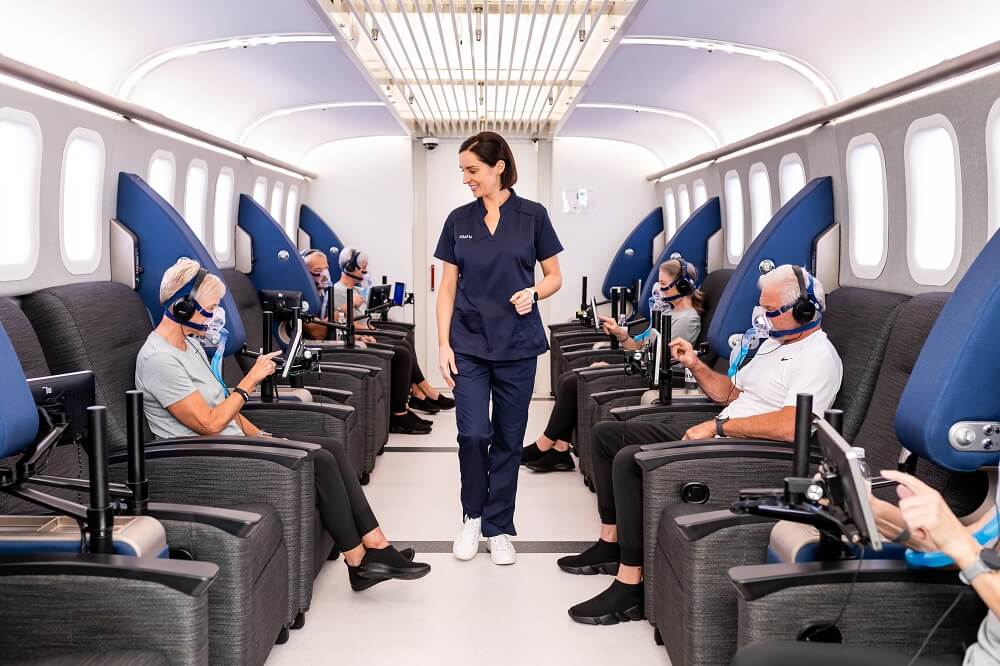
Understanding Long COVID Vertigo with Innovative Treatment Solutions


For those living with long COVID, persistent symptoms such as chronic pain, brain fog, chest pain, and fatigue can significantly disrupt daily life.
The emergence of vertigo as an ongoing symptom complicates an already challenging recovery journey. If you’ve never experienced vertigo, it’s hard to understand how debilitating it can be. Those who deal with near-constant dizziness find themselves nearly incapable of performing daily tasks, often ending up having to lay flat in bed with their eyes closed for hours every day.
While already tough to manage physically, vertigo’s impact takes an additional toll on the mental and emotional well-being of those grappling with the COVID-19 aftermath. The uncertainty and discomfort of long COVID vertigo can feel like a profound hurdle in the path toward normalcy.
However, there is hope in comprehensive post-COVID vertigo treatment solutions. These care interventions can provide much-needed support and relief, assisting those recovering from the many challenges of long COVID.
Understanding Vertigo

Vertigo is the disorienting sensation of swaying or spinning, even while holding still. The feeling might also come with a loss of balance, dizziness, or nausea. The vertigo experience can be highly unsettling, both physically and mentally.
Physically, vertigo may feel as though you’re spinning or like the world is in constant motion. It can cause a constant uncomfortable sensation of falling or toppling over.
Mentally, the nature of vertigo can increase feelings of anxiety and stress. Individuals tend to feel unable to accomplish everyday tasks or, in severe cases, even get out of bed.
The Connection Between Vertigo and Post-COVID

Although the coronavirus was first known for respiratory symptoms, widespread understanding of COVID-19’s impact on the body continues to evolve. For people with long COVID, vertigo can accompany other common post-COVID symptoms, further complicating their experience with the condition.
The exact mechanisms behind the condition are not yet well understood. It’s believed that COVID-19 may trigger neurological inflammation. This can affect areas like the inner ear, which is responsible for balance and spatial orientation. It also may explain why some individuals may experience vertigo as a lingering symptom.
Ultimately, this insight emphasizes the need for targeted post-COVID vertigo solutions that address the viral impact and the resulting changes in the brain.
Why Do Some People Develop Vertigo After COVID?
The connection between COVID-19 and vertigo identifies the effect it can have on the brain. It’s not uncommon for those with an acute COVID-19 infection to experience neurological symptoms—including headaches, dizziness, and cognitive difficulties.
Research shows that “up to 30% of COVID-19 patients have been documented to experience neurological problems.” Evidence suggests the virus can affect the central nervous system, leading to neurological symptoms such as vertigo.
Possible Mechanisms Leading to Vertigo in COVID Long Haulers
Developing vertigo after a COVID-19 infection suggests the virus also might impact the vestibular system—the complex network in the inner ear and brain responsible for maintaining balance, coordination of movements, and spatial orientation.
The vestibular system is like a built-in stability guide. It senses head movements and positions to keep the body balanced and oriented with its surroundings. Considering the impact COVID-19 can have on this system, recognizing this link is essential for addressing the symptom-related challenges.
Researchers believe there are other factors involved as well. Studies show that “vertigo may occur indirectly due to respiratory distress” after a COVID infection. Still, it also may be a consequence of other related mechanisms:
- Viral Invasion: Because the COVID virus can infiltrate the central nervous system, it’s hypothesized that its effects on the inner ear structures may cause dizziness or vertigo.
- Inflammation: Indicators of inflammation are found in higher concentrations in patients with COVID-19, indicating a strong inflammatory response may be responsible for disruptions in vestibular function.
- Changes in the Brain: COVID infections may result in “neurotransmission alterations” or changes in how nerve cells communicate, making it difficult for the vestibular system to maintain equilibrium.
Essentially, the vestibular system relies on brain and body structures and the pathways between them for optimal function. When these structures and pathways are compromised (as in many COVID patients), it can manifest through symptoms such as dizziness or vertigo.
Recognizing Vertigo Symptoms

Early recognition of symptoms is vital for managing any health challenges, which holds true for vertigo—particularly in the context of long COVID. Identifying symptoms allows for timely interventions and targeted care for a holistic long COVID recovery. These symptoms include:
- Spinning sensations
- Loss of balance
- Nausea or vomiting
- Dizziness
- Visual disturbances
- Anxiety and stress
Individuals may experience persistent sensations of movement or unsteadiness even when not in motion. These sensations can be disorienting, causing blurred vision, difficulty focusing, lightheadedness, or motion sickness. Ongoing vertigo can impact mental well-being, making it difficult to feel hopeful in the face of long COVID and other persistent symptoms.
Evaluation and Diagnosis

When facing vertigo symptoms, a thorough evaluation is crucial. This offers essential understanding of potential underlying causes, and can help to plan an effective course of action. Keeping context in mind when considering long COVID symptoms, practitioners can employ a systematic approach to diagnosis:
- Medical History: A detailed review of the individual’s medical and family history—including any previous COVID-19 infection—can help connect the viral illness and the onset of vertigo.
- Symptom Analysis: Specific details about the experience with vertigo, such as the degree of dizziness and the frequency of attacks, can help distinguish symptoms from other potential causes.
- Physical Exam: A comprehensive physical examination (including neurological and otologic assessments) helps practitioners identify any observable signs of imbalance or issues with the inner ear.
- Diagnostic Tests: Various tests may be employed to assess the vestibular system function, which plays a vital role in balance. These tests can include different postures or imaging scans.
- Laboratory Tests: Blood tests may be conducted to identify any lingering or underlying infections or metabolic issues that could contribute to vertigo.
An accurate diagnosis is crucial for developing an effective care plan, forming the foundation for appropriate post-COVID vertigo treatment options, and considering the full scope of the patient’s experience.
Treatment and Coping Strategies
Managing post-COVID vertigo involves a multidisciplinary approach, including medical intervention, medications, therapeutic measures, and other coping strategies. Below are several traditional post-COVID vertigo treatment strategies individuals often turn to for relief. Keep in mind that a cutting-edge solution for long COVID vertigo, as presented further down, can transform management of this condition.
1. Medical Treatment
Consultation with healthcare professionals specializing in neurology or otolaryngology can help individuals receive a thorough evaluation and diagnosis of vertigo after a COVID infection. Specialized physical therapy (known as vestibular rehabilitation therapy) can also help improve balance and coordination.
2. Medications
Healthcare providers may prescribe medications to help vertigo symptoms, including vestibular suppressants or antiemetics. In some cases, migraine medications can help, as some migraines are associated with the vestibular system.
3. Therapy or Counseling
Persistent vertigo often brings stress and anxiety. Therapy and counseling provide a safe space to share and validate the experience’s challenges and develop healthy coping strategies to support a positive mindset and emotional well-being.
4. Complementary Holistic Therapies
Some who experience vertigo explore holistic therapies like acupuncture or chiropractic care for symptom relief. These therapies—including mindfulness and relaxation techniques—may also help manage stress, which can exacerbate vertigo.
5. Lifestyle Modifications
Making lifestyle changes, including drinking enough water and sticking to a sleep schedule, can help control triggers and prevent recurring attacks. Some dietary changes may also help. This may be avoiding foods or substances that can worsen vertigo symptoms, such as foods high in sugar, salt, and caffeine. Those affected should also avoid alcohol and nicotine.

Prognosis and Recovery
The outlook for vertigo post-COVID can be different for everyone. It depends on factors such as the underlying cause(s), individual health, and the effectiveness of any treatment or care solutions. Because long COVID affects people differently, recovery depends on a comprehensive, personalized approach to improve chances of recovery.
Understanding the factors contributing to the development and treatment of vertigo with long COVID creates a clearer picture of what to expect:
- Duration of Acute Vertigo: Acute episodes of vertigo—especially those triggered by viral infections like COVID-19—may resolve within a few weeks to a few months with timely and targeted interventions.
- Long-Term or Chronic Vertigo: If vertigo becomes a chronic or recurrent condition, long-term management strategies are crucial to maintain and enhance quality of life.
- Choice of Treatment Option: The treatment and management methods have varying impacts on improving symptoms and reducing vertigo’s effects on daily life, with some treatments more effectively targeting the mechanisms responsible for the condition.
- Effectiveness of Treatments: Responsiveness to post-COVID vertigo treatment methods, including medications, therapies, or medical interventions, is crucial in determining the expected duration.
- Ongoing Management: Support and stability can make it much easier to manage vertigo symptoms. A robust support network and commitment to management strategies can minimize the impact of symptoms.
Remember that recovery can be highly individual. Some may experience symptom resolution within a short period, while others may need more significant, longer-lasting intervention. Factors like overall health, adherence to treatment plans, and other symptoms or conditions contribute to this variability.
Cutting-Edge Solution for Long COVID Vertigo

Because of its disruptive and disorienting nature, addressing post-COVID vertigo can require a forward-thinking and integrated approach. Innovative therapies, personalized treatment plans, and a commitment to holistic well-being provide individuals with more resilient and effective solutions, even where traditional strategies have fallen short.
A Unique Protocol for Vertigo After COVID
At Aviv Clinics, addressing long COVID (including the presence of vertigo) goes beyond symptom control. Instead, long COVID management takes a multidisciplinary approach to recovery. This is found through the holistic Aviv Medical Program, which can include physical and cognitive training, nutritional guidance, and the world’s most advanced hyperbaric oxygen therapy.
Hyperbaric oxygen therapy, or HBOT, is a powerful healing catalyst. It involves breathing oxygen within a pressurized chamber to increase oxygen levels in the bloodstream and tissues significantly. The transformative effects of this solution lie in a unique protocol and its ability to awaken and bolster the body’s natural healing mechanisms.
Through the unique Aviv Clinics Medical Program and HBOT protocol, which fluctuates these oxygen levels following an evidence-backed method, the body’s innate ability to heal itself activates powerful changes at a cellular level.
This healing potential can be life-changing for people living with long COVID vertigo. These protocols draw from ongoing research in neurology and can be especially helpful for those looking for a multifaceted way to manage long COVID symptoms.
To learn more watch an exclusive video presentation: Can you Recover from Long COVID Symptoms
The Aviv Medical Program

The Aviv Medical Program offers COVID long haulers a way to take control of their lives in the face of challenging symptoms. The program is customized to address the individual’s specific needs and goals, focusing on the underlying causes of symptoms to help improve overall quality of life.
The Aviv Medical Program includes several phases:
- Assessment: Before beginning the program, a comprehensive medical assessment examines your unique medical history, overall health, and any specific concerns. The assessment results help tailor the program to your unique needs.
- Treatment: Daily treatment solutions over 12 weeks—which can include dietary plans, physical training, patented cognitive training, and HBOT—harness your body’s natural healing mechanisms and improve your performance.
- Post-Assessment: We conduct a detailed analysis of your response to the program, examining shifts in well-being, health changes, or symptom improvement.
- Follow-Up: Our commitment to your health extends beyond the program. Periodic check-ins and evaluations address evolving needs and concerns to prioritize your long-term well-being.
Throughout the program, our dedicated medical team works in tandem with you, fostering a collaborative and supportive environment on your journey toward healing.
Celebrating Success Stories in Long COVID Vertigo Recovery
From disorienting challenges to a sense of balance, these stories illustrate the transformative impact of the Aviv Medical Program on the lingering effects of long COVID:
Traveling Across the Globe to Treat Crippling Long COVID Symptoms – Fleury’s Story | Aviv Clinics
Lynette’s Long COVID Recovery Story | Aviv Clinics
Danielle’s Long COVID Recovery Story | Aviv Clinics
Long COVID Recovery at Aviv Clinics
Yes, there is hope if you’ve been dealing with the impairing effects of post-COVID vertigo. Aviv Clinics stands at the forefront of innovative solutions for individuals with long COVID, offering relief for those seeking comprehensive and effective recovery programs.
Get your life back—take the next step to learn more about Aviv Clinics. Discover how the long COVID recovery program can help you find a renewed sense of function and vitality.
Aviv Medical Program provides you with a unique opportunity to invest in your health while you age